Interview with Roger Corman & Julie Corman of DINOCROC VS. SUPERGATOR
Maj Canton - June 25, 2010
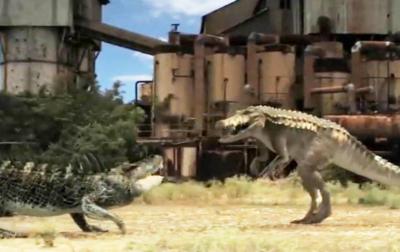
Crocs, gators and sharks! Oh, my!
TV Tango recently participated in a conference call with Roger and Julie Corman, Executive Producers of DINOCROC VS. SUPERGATOR, which premieres on Saturday, June 26, 2010 at 9pm ET/PT on Syfy. Roger and Julie answered more than 30 questions about their popular Syfy movies, working with David Carradine, and dishing on their favorite films.
First, check out the entire interview, and then scroll to the bottom to watch three sneak peeks of the movie.
|
|
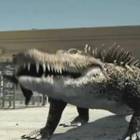 |
Question: How did you two get started on this movie? Roger Corman: Well, we made a picture called DINOCROC five years ago, which was extremely successful on the Syfy Channel. They've got, I believe, the biggest rating of the year. And we followed that a couple of years later with SUPERGATOR, which got an almost equally high rating. So it just seemed a logical thing to go DINOCROC VS. SUPERGATOR. |
|
|
 |
Question: How is this one different from the other two? Roger Corman: We built up the creatures, the Dinocroc and the Supergator. We had a certain amount of special effects. I've forgotten the exact number in both DINOCROC and SUPERGATOR.
And we increased the number of special effects by about 50% on this picture, because we had not only the individual creatures we had the epic clash between the creatures at the end of the picture. |
|
|
 |
Question: How did you become fascinated with reptilian and amphibious creatures in your recent films? Roger Corman: We didn't start out to do a series of amphibian pictures. We started out just to do DINOCROC. It's similar to when I did six Edgar Allan Poe pictures in the '60s. I didn't start out to do a series, I started out just to do Poe's THE FALL OF THE HOUSE OF USHER.
It was successful, so we did five more. And so we were simply trying to do DINOCROC, which I thought was a very good science fiction/horror subject. And when it was finished, Syfy Channel asked me to do another one that was similar and that gave rise to SUPERGATOR. |
|
Matter of fact, there's a little story behind SUPERGATOR. I was having lunch with executives of the Syfy Channel in New York and they asked me to do a second one and I said "Sure, DINOCROC 2." And they said "No. When we do number two we get a lower rating. What we want is a similar title, but not exactly the same."
And I said, "Did I say DINOCROC 2? I meant, of course, SUPERGATOR." And they said "Yes, we'll make SUPERGATOR."
Julie Corman: Do you think we should be urged to suggest DINOCROC VERSUS SHARKTOPUS? Roger Corman: Yes, if we continue, that's the inevitable next one. |
|
|
|
 |
Question: How long did it take you to shoot DINOCROC VS. SUPERGATOR? Roger Corman: This was about three and a half weeks. That's normal for our pictures with the Syfy Channel. We figure a week generally we're shooting on location, so a week is six days on location and it goes about 20-21 days, depending upon the script. |
|
|
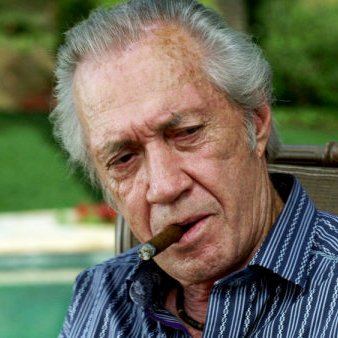 |
Question: Could you talk a little bit about working with the late great David Carradine on this film? Roger Corman: Well, we've worked with David Carradine on and off since the 1970's. The first picture he did with us he starred in, which was DEATH RACE 2000, which was one of our bigger hits. He followed that with DEATH SPORT and then I don't know how many pictures we've made together.
And he was a logical choice for the billionaire financier of the research that created the DINOCROC and the SUPERGATOR and so we just went to him as we normally do. |
|
|
|
|
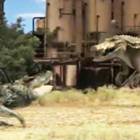 |
Question: The ending of DINOCROC VS. SUPERGATOR left things up in the air a little bit. Do you have a sequel in the works? Roger Corman: We left it deliberately open, but we have no specific plans for a sequel at the moment. I think we've played the theme of the amphibious creature coming out of the ocean or coming off the land and going into the ocean enough.
We might do one more picture after SHARKTOPUS, but after that, I think it's time to vary the formula. But we did leave it open just in case we change our minds. |
|
|
|
Question: Do you insert scenes on the fly or if something doesn't feel right do you edit on the spot? Roger Corman: The director, Jay Andrews, followed the script 90%, which is normal for the way we work. We generally follow the script very closely, but we always give the director leeway to make some changes as he or she goes along and Jay felt that some scenes added little emotional moments. |
|
|
|
|
Question: Are there scenes in DINOCROC VS. SUPERGATOR that you wish hadn't been deleted? Roger Corman: No. There were no scenes deleted that we liked for the simple reason that the picture was a little bit short and we put in every single thing that we shot. It was almost the other way. There were a couple of moments that I would have taken out had there been no time limitation. But for Syfy, you have to meet an exact time requirement. So it would be the other way. Julie Corman: There's a scene in SHARKTOPUS that maybe I should or shouldn't mention, but we were down in Puerto Vallarta shooting and we suddenly needed an actress for a scene in which she goes bungee jumping and then is eaten by Sharktopus. And our daughter happened to be visiting us for two days. And I said get your bathing suit on and go get out there. We don't have an actress for this scene. So she went and did it and she has subsequently questioned her acting ability, but we don't. |
|
|
|
|
Question: Can you talk about SHARKTOPUS? Will it tie into DINOCROC and SUPERGATOR or is it going to be something completely separate? Julie Corman: Something absolutely new and like nothing you've ever seen before, special effects dine-o-mite. We have some new talent and we have Eric Roberts, the glue holding it together. The creator of monster with the best intentions to help out the Department of Defense with a firm called Blue Water.
And we shot again in Puerto Vallarta using all the locations that we didn't use for DINOSHARK and we had a lot of fun. |
|
|
|
|
Question: What are your thoughts about Syfy's B Movie Mogul, allowing viewers to create their own TV movie? Julie Corman: I think it's genius. This comes out of Karen O'Hara's brain, I believe, who did their Twitter that led to a lot of (dust up) in a good way over the title SHARKTOPUS before we even got started with radio personalities demanding to get parts in the film and be eaten by a shark and so on.
And it just sounds like the logical extension of her Twittering. So I'm looking forward to see what happens and if they're also going to be voting on who they want to produce and who they want to direct. |
|
|
|
|
Question: How would things be different if a channel like Syfy existed when you first started? Roger Corman: That's a hard question to answer, but I can tell you this. The situation is different. When I first started out, every low-budget picture and every picture that was of at least decent commercial quality got a full theatrical release.
Today, the majors -- with their tent-pole $100+ million pictures -- dominate theaters to such an extent that independent pictures are pretty much frozen out. So Syfy Channel today is extremely important to us.
If the channel had existed when I first started out it would be important, but not as dominant as it is today. It would simply be an additional way to distribute a film in addition to the theaters. |
|
|
|
|
Question: What are the major differences between making a theatrical film and a TV movie? Roger Corman: I think you approach them, generally, in the same fashion. You start with an idea. You develop the screenplay. You bring in the director -- possibly, right from the beginning, working with the writer, or it could be a writer/director. The difference is simply the amount of money you have to spend.
On a bigger budget picture, you're going to have, clearly, bigger sets, more special effects and specifically, a longer shooting schedule. And it'll be more complicated.
So more people are working on the project and I fear that in some of these pictures, the original vision of the producer or the writer or the director or all three gets a little bit diffused with the number of people and the complications of making one of these giant films. |
|
|
|
|
Question: What are the most significant changes within the industry since you started? Julie Corman: Well obviously, technologically, there's been a major change with the arrival of digital and we're ready. They're not even moving fast enough as far as we're concerned, because some want delivery on films still and most have moved to everything digital. So, you know, certainly, technologically it's made a lot of difference.
The other thing is that the majors have encroached on a lot of the territory of the independent filmmakers. So it's harder and harder for independent film makers to compete either on a level of what they're spending on their budgets or what they're getting in terms of theatrical distribution. But it's still about doing the projects and finding the outlets where you can.
I think, having lived through the 60s, that there was a great excitement and a feeling that in those days' young people could change the world with their ideas. And I see in the young people coming out of school today, a trend toward a little more cynicism than there was at that time and a feeling of being swept up in the multitude more.
I mean certainly there was concern about it in those days, but there still was a feeling that if you felt something very strongly in the area like civil rights, the war you could do something about it. And I think there's a little more trend towards futility. Roger. Roger Corman: I would go along with what Julie said. |
|
|
|
|
Question: Can you talk about the recent resurgence of B-movies? Roger Corman: Well, I think any work of creativity reflects the culture in which it's made. And I started in the late 1950s and the Cold War influenced much of what we were doing, particularly in creature or monster pictures. It was always a result of atomic radiation.
We move to today and now we're talking about genetic engineering as the basis of the creature. In other words, we react to the world around us. |
|
|
|
|
Question: How do you pick a movie to do? Julie Corman: Well, in the case of the science fiction ones, they mostly come out of ideas that Roger had and working with writers to develop them. So sometimes it's from the point of view of the monster, and sometimes it's not from the point of view of the monster. So it kind starts there.
Sometimes it can start with a location. In the case of DINOSHARK, we had this great location in Puerto Vallarta where we had been for a film festival and began to talk about doing a movie there and it worked out really well.
And Syfy seems to know their audience very well and their audience likes Roger Corman movies, monsters. And one thing has led to another, but basically, they're coming out of Roger's mind. |
|
|
|
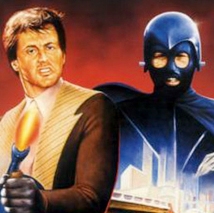 |
Question: Which of your movies is your favorite? Roger Corman: For the moment, I might pick DEATH RACE 2000, primarily because Paul Bartel directed it very well and then we had a certain amount of automobile racing in it.
And I remember one day the key stunt driver wanted what's called a bump. That is, he wanted a raise because he thought the stunt was too dangerous in the car. And I said, "Give me the helmet, I'll do the stunt myself." And so I remember driving being the stunt driver in DEATH RACE 2000. It was more fun than scary. I figured I can do this. |
|
|
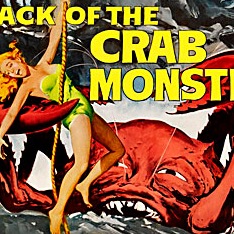 |
Question: Which of your creature films are your favorites? Roger Corman: Probably, I would go with DINOCROC for the current films. Going back -- because it was the first and, to us, the most original of the last few films we've done -- I might pick PIRANHA, Dante directed and was a solid success for us. Also, maybe HUMANOIDS FROM THE DEEP. Julie Corman: How about CRAB MONSTERS? Roger Corman: Oh, CRAB MONSTERS, which I shot when I first started. I was on a ten-day schedule and on a budget of $70,000 and we had a lot of trouble because the waves were trying to break up the crab monster as we were trying to shoot it. Julie Corman: And he had a leading lady in one picture who objected to the size of the monster. |
|
|
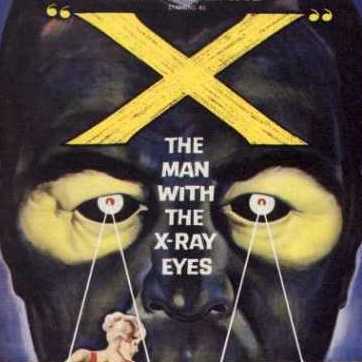 |
Question: Which of your older movies would you like to remake with a bigger budget? Roger Corman: There's one picture. A picture I made around 1960 or so-called X: THE MAN WITH X-RAY EYES. Ray Milland played the lead. Dr. Xavier, thus the letter X, who was doing research on vision and develops a condition that he's able to see through things.
And we did the best we could with the low budget and the special effects of the time. I've always thought that's a picture that would lend itself to be remade, because today with computer graphics and green screen and other types of special effects, we could get the affect of seeing through things much better. |
|
Julie Corman: And I feel the same with a project called NIGHT FALL, which is from a short story by Isaac Asimov that was voted the best science fiction story of all time by the Science Fiction Academy. So it's about a planet that only sees darkness every 2000 years or so and so the people being unused to darkness go mad in the night. And yes, on a low budget, it was kind of hard to create that world. |
|
|
|
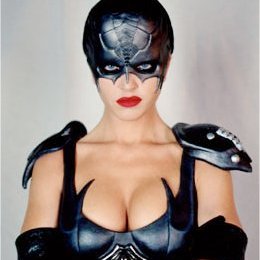 |
Question: Besides BLACK SCORPION, which of your films do you think would make a good TV series? Roger Corman: I've had a couple of thoughts, but nothing specific. I can't remember. BLACK SCORPION was a major success for us as a motion picture. And it was so successful that a German company wanted to buy the rights to make a TV series and I thought, well why sell them the rights, I can make one myself. The series ran one year and got decent ratings, but wasn't really a success.
BATTLE BEYOND THE STARS was a story of interplanetary mercenaries who save a planet from an invader. They could go onto other adventures. |
|
|
|
Question: What do you think about the comic book adaptations of your movies? Roger Corman: The only one I've seen is BLACK SCORPION, and I thought they did a good job. The story line was well developed and I thought the quality of the cartoons was good. So I was pleased.
I know that it's not an expensive company. They don't have a huge amount of capital, so they have to function with a little bit less money per issue than some of the other comic book companies, but for the amount of money they have to spend, I was pleased with the work. |
|
|
|
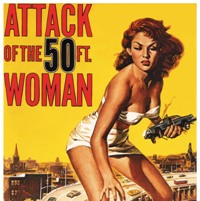 |
Question: Which of your movie posters is your favorite? Roger Corman: At the office we have DEATH RACE 2000, which I think is -- I can't remember every poster we've done -- but I would say that one. Plus, there's a poster that's become a classic that I designed for a friend of mine. There was ATTACK OF THE 50-FT WOMAN. I designed that poster as a favor and that thing has been reprinted over and over and over. |
|
|
|
Question: Are there any failed projects you've worked on over the years? Roger Corman: There were two projects I developed and on which I couldn't get financing. They were a little bit too big for the budgets. We finance our own pictures and since we don't have that much money, our pictures are generally medium and low budget films.
But I developed a screenplay on the great Confederate General Robert E. Lee and I developed another screenplay on Crazy Horse, the Indian Chief who led the charge that killed Custer and his men at the Battle of Little Bighorn. Both of the scripts are good scripts. I couldn't get financing for them, but I have them still somewhere in the back of the mind that maybe I'll get back to them. |
|
|
|
|
Question: What projects do you having coming up? Roger Corman: SHARKTOPUS is the upcoming Syfy picture. DINOCROC VS. SUPERGATOR is coming out shortly and SHARKTOPUS will be coming out in the Fall. That, for the moment, finishes our amphibian creature series.
I've produced another picture called STEALING LAS VEGAS which is a story of a group of employees of a casino who rob their own casino. These Las Vegas caper pictures are always like OCEAN'S ELEVEN where the slicks and criminals come in. But in this one the casino is about to close and the employees know they're not going to get paid. So the janitor, the electrician, the plumber, the parking lot attendant and a group of other similar guys and the drinks girl plan to rob the casino, because they more about how the casino works than anybody else. |
|
|
|
|
Question: Who are your influences and sources of inspiration? Roger Corman: There was nobody in particular that I can point to. I can point to a few directors when I was very young that I admired. I would probably say Alfred Hitchcock, John Ford and Howard Hawks work - whose work I liked very much.
And probably the one, if any one influenced me more than the others, it was probably Hitchcock. |
|
|
|
|
Question: Are you more proud of your resume or the number of successful filmmakers you've inspired? Roger Corman: I'm proud of them all. I'm more or less pleased with what I did as a director and, of course, I'm delighted with the number of directors who started with this -- not only directors, but actors, producers and writers. |
|
|
|
|
Question: What would like to be remembered for? Roger Corman: From my standpoint, I'd like to be remembered just as a filmmaker. Partially for the films I, myself, produced and directed and partially for the number of people who started with this and have gone on to have had great careers. I think the two run together and that would be my thought. Julie Corman: Well probably from my viewpoint, it's the ability to put together the talents and then watch and see what the synergy was. And by starting with the idea and then moving to the writer and the director and the actors and right down to the editor.
And then as they say, the projectionists, they all have their input as to what makes the film go or not go. But for me as the sort of collegial aspect of it, which is a little hard to describe, but that's - when I feel what it is that I love about having made films, that's what I love. |
|
|
|
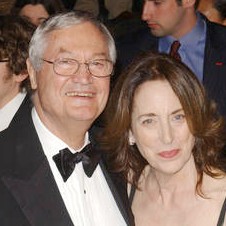 |
Question: How is it working together and being married? Roger Corman: Actually, we work together surprisingly well. Julie Corman: We can't agree on what kind of tile to have in the kitchen, but we don't have this problem in working. |
|
|
|
Question: Julie, what do you do when you're not producing with Roger? Julie Corman: Well, I've done a number of things. I've produced a lot of films in various genre and I just kind of fell into the science fiction thing coming out of a location that was a great location for CYCLOPS.
And so I went to Bulgaria because they had this location of ancient Rome and CYCLOPS miraculously got from Greece to ancient Rome.
And then sort of going from there it kind of worked well. I think, partially, because most of the things that I really like -- like the rough-and-tumble of production and setting things up and so on -- are things that Roger would rather not be involved with on a day-to-day basis.
And, you know, I'm somewhat involved in the script development and with the editing, but it's primarily Roger, like 95% or more so... Roger Corman: I wouldn't say 95%, you ought to cut that... Julie Corman: Okay. Well, right now I'm trying to cut my most unfavorite line out of our current production, SHARKTOPUS. The most unfavorite being, "Are you all right?" after all hell has just erupted. Anyway, you know, it seems to work well, but we don't usually work together and it just has happened and it's been pleasant. |
|
|
|
|
Question: Julie, I know you produce, would you ever be interested in writing and directing? Julie Corman: I wrote the story for one picture that I did that was based on personal experience. It was extremely difficult for me, because I'm very critical. So it was hard to do. And I've had a couple of other ideas that I haven't really, you know, carried them forward like that. And I think that one director in the family is enough so. |
|
|
|
|
Question: Are any young actors or directors that you worked with recently that Roger Corman: I think Declan O'Brien who did SHARKTOPUS definitely has the potential. We have a number of good directors. Jay Andrews who did DINOCROC VS. SUPERGATOR and Kevin O'Neil who did DINOSHARK. I would say probably those three. Julie Corman: I think Roger was hoping that one of his directors would be available for some more low budget pictures. I have trouble pronouncing his name. Timur Bekmambetov. But he leapt over the wall. Roger Corman: He is a Russian director who did his first picture for me and followed it up by doing the biggest grossing picture in the history of Russia and he came over here and I've forgotten the name of the picture. It was a big action picture. He's on his way to being a major director. Matter of fact, he is already. He did a picture called THE ARENA for us. |
|
|
|
To get ready for the premiere of DINOCROC VS. SUPERGATOR on Saturday, June 26, 2010 at 9pm ET/PT on Syfy, check out this preview:
